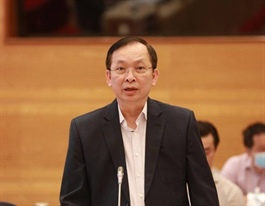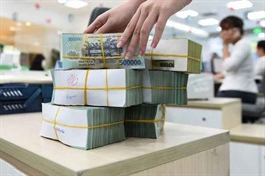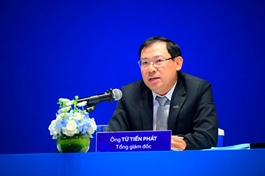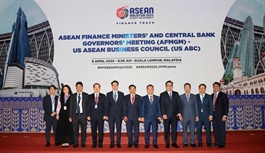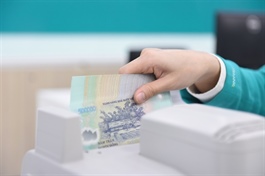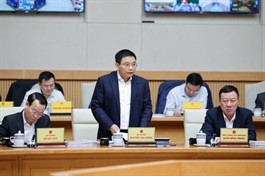Tariff freeze gives businesses breathing room to adjust
Tariff freeze gives businesses breathing room to adjust
US President Donald Trump announced a 90-day suspension of retaliatory tariffs on April 10, for 75 key trade partners, including Vietnam. Vietnamese businesses are being urged to treat as an opportunity for strategic recalibration amid growing global uncertainties.
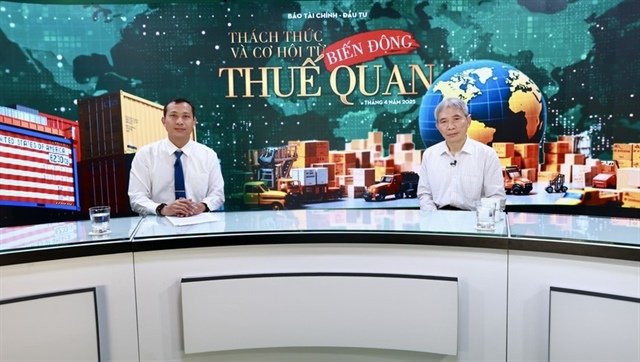
Ngo Sy Hoai, vice chairman and general secretary of the Association of Vietnam Timber and Forest Products (right), discussing the tariffs. Photo: Chi Cuong |
Speaking on a talk show hosted by VIR to discuss the tariffs on that same day, Ngo Sy Hoai, vice chairman and general secretary of the Association of Vietnam Timber and Forest Products, spoke about how the timber industry is navigating this particularly volatile period.
The US initiated a national security investigation into imported sawn timber on March 1, raising concerns of potential tariffs of up to 25 per cent on wood materials and products from Vietnam, with, the looming threat of retaliatory tariffs ready to induce more market stress.
"We’ve already developed scenarios assuming President Trump might pause investigations for negotiation purposes," said Hoai.
Vietnam is currently the world’s leading supplier of wooden furniture to the US, with export turnover of about $9 billion, with Vietnamese timber products accounting for 38–40 per cent of US imports in this segment.
From a legal advisory perspective, Truong Huu Ngu, managing partner of Vilasia, observed that while businesses are worried, they are also actively seeking ways to adapt. "Every challenge presents an opportunity. We’re witnessing a turning point for Vietnam’s economy to diversify markets, reduce dependencies, and enhance internal resilience," said Ngu.
Ngu described the 90-day delay as more than just a calm before the storm, "This could well be a golden period for Vietnamese enterprises to realign and prepare," he said.
Hoai stressed that the real challenge lies ahead. Any agreed tariff compromise between Vietnam and the US may still impose considerable pressure on timber exporters. “Export segments like wood chips, pellets, and timber products already operate on very slim margins. Even a modest tariff increase could significantly strain Vietnamese businesses,” he explained.
Meanwhile, US retailers such as Walmart, Target, and Amazon are unlikely to absorb cost hikes caused by new tariffs. If product prices rise, these distributors may scale back or suspend orders, waiting on negotiation outcomes.
Amid global economic uncertainty, businesses must prioritise risk mitigation–and for Ngu, that starts with contracts. He recommends that exporters scrutinize existing agreements for clauses covering force majeure or price renegotiation in the face of market disruption. Likewise, suppliers should review input contracts to ensure flexible responses to changing conditions.
Equally important is compliance. "Now more than ever, businesses must ensure robust documentation to verify the origin and legality of goods, as protection against retaliatory duties," said Ngu.
Looking ahead, Hoai urged the timber sector to shift focus from volume-driven to value-driven growth. "It’s like climbing a mountain–you sometimes need to pause, or even step back, to chart a sustainable path forward. This is the moment for Vietnam to rethink its growth model," he said.
"We must invest in technology, digital transformation, and product design that reflects Vietnam’s cultural identity. Building our own brands is the only way to escape the limitations of outsourcing."
While the US remains a crucial market, Hoai went on to speak of the significant opportunities in Japan, South Korea, China, and the Middle East. "Vietnamese exporters have yet to fully tap these markets. Japanese and Korean consumers value natural wooden furniture and interior spaces. Local firms need to understand these demands and seek expert advice on market-specific products," he said.
"We need to dig deeper, create more value, and invest in our own materials and branding. That’s how Vietnamese companies can compete in a volatile world," added Ngu.
Ngu also encouraged businesses to take fuller advantage of free trade agreements (FTAs) such as the EVFTA with the EU and the Comprehensive and Progressive Agreement for Trans-Pacific Partnership with Japan, Australia, and Canada. These FTAs favour high-quality products that meet safety and traceability standards–especially in textiles, certified timber, processed foods, and supporting industries.
Beyond traditional markets, emerging economies like India, Israel, and the UAE offer new FTA-based avenues, requiring Vietnamese firms to identify niche opportunities and adopt appropriate strategies.
To future-proof operations, Ngu urged companies to build contractual risk defences, explore financial tools like trade credit insurance and FX hedging, and seek policy and financial support from the government and banks. He cautioned against hasty cost-cutting, especially through mass layoffs, advocating instead for legally sound and humane restructuring approaches.
Ultimately, he concluded, firms with both domestic sales and export footprints are proving more resilient. "The lesson of not putting all one's eggs in a single basket remains as relevant as ever," said Ngu.
- 15:22 11/04/2025







